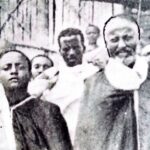DEL WANBARA
- 2 Min Read
Del Wanbara, (16th century), whose name means “Victory is her seat” was famous as the wife of two leaders of the 16th century Muslim conquest of Ethiopia. Her title was Bati. The dates of her birth and death are unknown.
She was the daughter of Imam Mahefuz, governor of Zayla, the port on the Gulf of Aden, 25,mi (40 km) east-south-east of modern Jibuti, who was also de facto controller of the state Adal, an emirate in the eastern lowlands, near the Straits of Bab-el-Mandeb, at the entrance to the Red Sea. She married Ahmad Ibn Ibrahim, also known as the Imam Ahmad Gran, the conqueror of Ethiopia, and accompanied him on his expeditions against his soldiers’ protests, which she ignored.
There are records of the difficulties of the journey, of her having to be carried over mountain tracts over the shoulders of the soldiers, and of her giving birth to two sons – Muhammad in 1531, and Ahmad in 1533 – in the Tegrean mountains during the campaign. After Gran’s defeat and death in 1543, she fled to the Atbara, a tributary of the Nile, which rises northwest of Lake Tana, but eventually regained Harar, the center of Muslim activity.
Her first task was to make arrangements for the exchange of her son, Muhammad, who had been captured after the defeat of Gran, for Minas, brother of the Emperor Galawdewos, whose life had been saved through her intercession.
After this task was accomplished, she recognised Nur Ibn Mujahid, son of Gran’s sister, as the man most capable of succeeding the great Imam, and she made vengeance for his death the condition of her accepting his offer of marriage in about 1552.
TRIMINGHAM, J. S.





